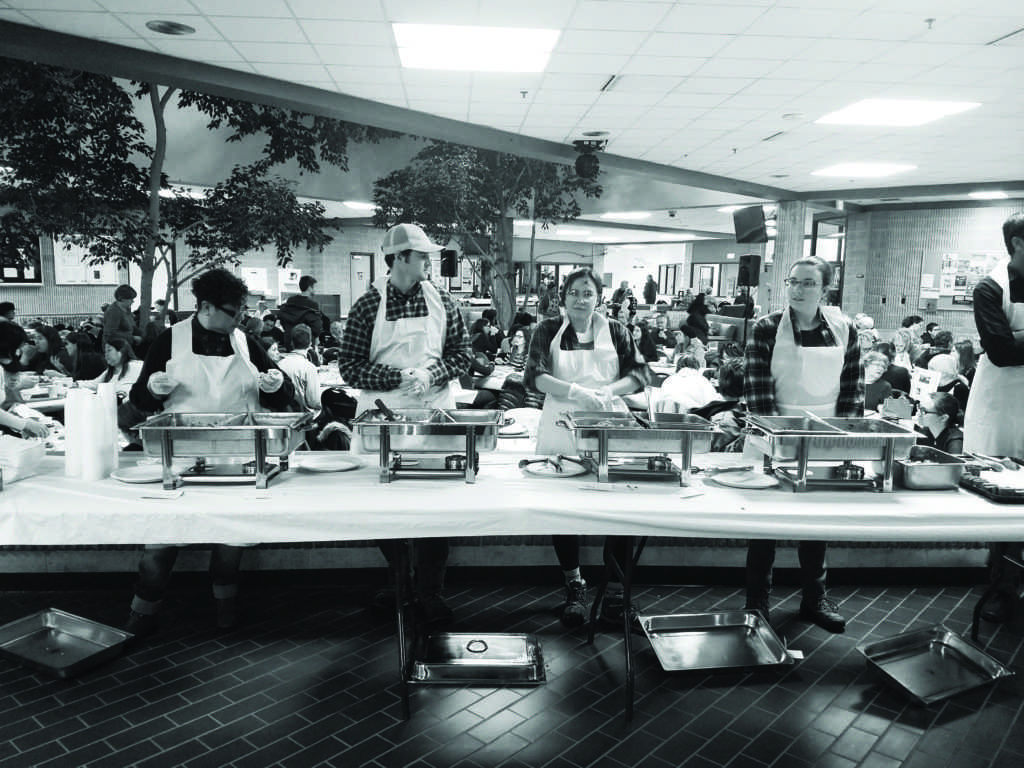Red Cliff Native American Frank Montano, 77, a folk musician since the age of six, was first contacted 10 years ago to play the flute at the eighth annual First Nations Food Taster (FNFT).
In 2008, Montano spent two weeks in Marquette after the FNFT, traveling to local schools during the weekday, teaching
lessons from Native stories and music. While in town on the weekend, Montano taught 18 kids in the Marquette School District how to carve their own flute.
“Montano’s performance at the eighth annual FNFT
10 years ago inspired me to start playing the flute. I was in search for a spiritual change in my life at the time,” Danny Garceau said, director of the Warrior
Society for the Society of American Indian Government
Employees (SAIGE).
On Friday, Nov. 9, at the
18th annual FNFT, Montano and Garceau, on the flute, performed together on stage for hundreds
of attendees at the Jacobetti Complex.
Montano and Garceau were not the only ones at the eighth
annual FNFT 10 years ago. Hannah Milkie, an NMU junior art and design major and Marquette local has been coming to this event since she was a teenager with her parents.
“I grew up in Marquette so my Mom has been bringing me since I was 10, so I’ve been coming for 11 years now,” Milkie said. “My favorite dish here is the bison stew. I also go to Powwows every now and then, and always get
the fry bread.”
Fry bread, which is similar to an elephant ear, is a cultural
Native food but not traditional food, and is not served at
the FNFT.
“We did not traditionally have the [fry bread] ingredients. It is a direct response to colonialism as those ingredients were
distributed to us through commodities and we made what we could to survive. Fry bread
continues to affect people of Indian Country by causing health issues like diabetes and heart disease,” NASA Vice President Grey
Shey said.
Event organizers used recipes that worked with the Decolonizing your Diet Program (DDP), which is an effort to reclaim food from pre-colonial times by cooking with local ingredients. Jud Sojourn, assistant professor at the Center for Native American Studies said a recipe for fry bread that works with the DDP is under construction but not perfected.
“We haven’t figured out a base for fry bread but we are working on a DDP fry bread. We don’t want to give a fry bread that’s not very good, we want to give
a really flavorful fry bread but we are still experimenting with
that recipe. Hopefully in a few winters we will have that recipe,” Sojourn said.
The recipes have a life of their own and continue to be experimented with different seasoning and base ingredients in attempts to move toward the DDP as much as possible, Sojourn said.
“The idea is to be very specific with the food that is being prepared. Every subtle thing being used, like sea salt instead of iodized salt and even the very species of trout that we cooked would have been eaten here by the Natives, it’s old-timer
Anishinaabe food before the French,” Sojourn said
This year the FNFT had to make compromises based on the donations and used regular flour in the crab apple crisp.
“We were working best with what we had, so it’s not a pure DDP menu but it’s close, and we did the best we could,” Sojourn said. “It’s just really a good feeling to do things the correct way or the right way–it just feels right.”























